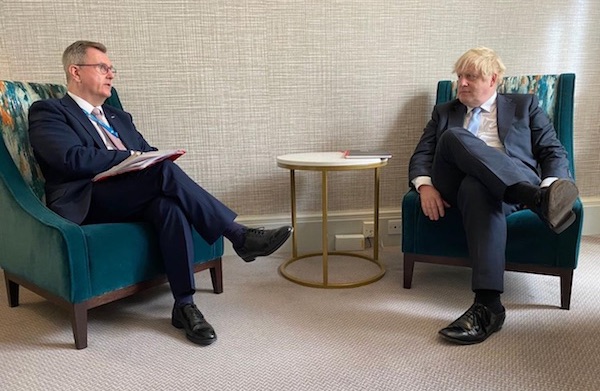
Rejectionist unionism continues to be indulged by the British government, despite Sinn Féin winning the Stormont Assembly election and nationalist parties outpolling unionist parties in a Six County election for the first time.
Despite only losing four seats, unionism’s failure to prevent the election of a first ever nationalist head of government in the north of Ireland appears to have pushed the DUP further into a destructive, downward spiral.
The extent to which the main unionist party plans to undermine the institutions of the Good Friday Agreement will become clearer on Friday, when the DUP is reportedly considering blocking the appointment of a Speaker in order to sabotage both the Assembly and the Executive.
Hardline unionists continue to demand an end to Brexit-related checks on goods traded at sea ports in the north of Ireland, which they have described as an “Irish Sea Border”. They instead advocate a hard border through Ireland.
When asked if he might block the Assembly’s return, DUP leader Jeffrey Donaldson has refused to say. But there is a significant threat to the credibility of the North’s institutions if the losers of Thursday’s election are allowed to blackmail the two governments and the European Union.
There has so far been no sign the British government intends to drop its pro-unionist lobbying against the wishes of the majority in the Six Counties.
Instead, a collection of British ministers, including the Prime Minister, have been delivering belligerent and posturing statements vowing to unilaterally rewrite the Protocol, the outcome of which would likely be a trade war with Europe.
Although winning the support of England’s xenophobes, the drum-banging rhetoric of Tory politicians has left Irish and EU politicians scratching their heads.
German Chancellor Olaf Scholz stressed that “no-one should unilaterally cancel, break or in any way attack the settlement”.
The 26 County Minister for Foreign Affairs admitted he does not know if the British government is interested in working in partnership to resolve political difficulties, and that trust is “absent”.
Sinn Féin deputy leader Michelle O’Neill said that the DUP and British government must accept and respect the result of the Assembly election.
Ms O’Neill can’t take up her elected role of First Minister under Stormont’s rules unless the DUP agrees to take the role of Deputy First Minister, a humiliation many believe it beyond the party’s capacity to endure.
Speaking as Sinn Féin’s new Assembly team gathered at Stormont for the first time, Ms O’Neill said people in the north of Ireland would not be held to ransom.
“Brinkmanship will not be tolerated where the north of Ireland becomes collateral damage in a game of chicken with the European Commission,” she said.
“Responsibility for finding solutions to the Protocol lie with Boris Johnson and the EU. But make no mistake, we and our business community here will not be held to ransom.”
There are growing concerns that Donaldson may never agree to serve as Deputy First Minister in tandem with a Sinn Féin First Minister. His decision to remain as a Westminster MP, only days after winning election to the Stormont Assembly, brought accusations that his interests and power-base remain in London.
All of the other parties at Stormont have called on the DUP to allow an Executive to be set up as quickly as possible, particularly in light of the expanding economic crisis.
Alliance Party leader Naomi Long, whose cross-community party made huge gains in the election, urged the DUP to “step up to the plate” and that it would be “foolhardy for them to overplay their hand”.
And leading US politicians have again warned that any unilateral move by the British government to override parts of the Protocol would threaten the Good Friday Agreement.
In a joint letter Congressman Bill Keating, chairman of the foreign affairs subcommittee on Europe, and Congressman Brendan Boyle, co-chair of the Congressional EU Caucus in the House of Representatives, pointed our that the majority of those elected in the Six Counties supported working within the parameters of the Protocol.
The Congressmen said they were alarmed by reports that Britain was considering breaking off negotiations.
“The worst outcome of Brexit would be one that lead to violence and upheaval in Northern Ireland,” they wrote.
They called on the British government to “uphold your end of the deal and act in good faith, within the parameters of international law, to maintain peace and stability in Northern Ireland”.
![[Irish Republican News]](https://republican-news.org/graphics/title_gifs/rn.gif)
![[Irish Republican News]](https://republican-news.org/graphics/title_gifs/harp.gif)

